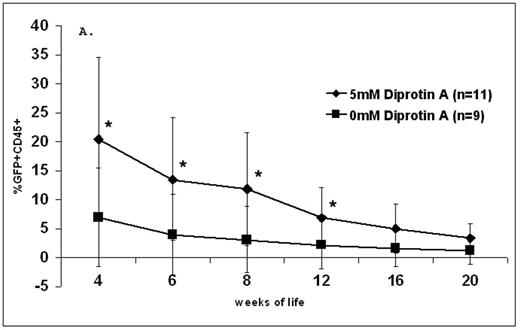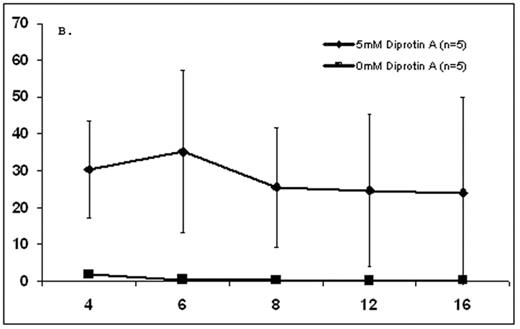Abstract
In utero bone marrow transplantation (IUBMT) induces donor-specific tolerance for postnatal cellular or organ transplantation. Consistent induction of tolerance requires a threshold of mixed hematopoietic chimerism (>1%). CD26 is a peptidase whose inhibition has been demonstrated to influence granulocyte colony-stimulating factor induced mobilization of hematopoietic stem cells and increase homing and engraftment of BM cells in adult transplantation models. We hypothesized that CD26 inhibition would increase the frequency and levels of allogeneic hematopoietic chimerism after IUBMT.
Methods: B6 GFP BM was injected intravenously into E14 Balb/c fetal mice at a dose of 20e6 cells/fetus with or without CD26 inhibition with diprotin A. Early kinetic analysis was performed to assess donor cell homing to fetal liver (FL). Peripheral blood (PB) was analyzed up to 20 weeks after birth for donor cell chimerism and multilineage engraftment by flow cytometry. PB was also analyzed for donor cell chimerism at the same time points from Balb/c mice receiving 10e6 CD26 inhibited GFP BM cells coinjected with 10e6 noninhibited congenic B6Ly5.2 BM cells at E14 to assess for an in utero competitive advantage provided by CD26 inhibition.
Results: CD26 inhibition increased donor cell homing to the FL at 24, 48 and 96 hours after injection (69.27±8.19 vs 30.21±6.44, 57.20±14.63 vs 36.80±14.20, 46.14±15.79 vs 12.09±7.01; p<0.05 at all time points). The frequency and levels of engraftment at 4 weeks of life were increased in those mice receiving CD26 inhibited BM compared to noninhibited BM (50.0% vs 22.5%; 20.48±14 vs 6.96±8.44, p<0.05). Chimerism was multilineage and maintained at 20 weeks of age (figure 1a) supporting improvement of engraftment at the stem or early progenitor cell level (* p<0.05 comparing chimerism levels between inhibitied and noninhibited cells). The coinjection of CD26 inhibited and noninhibited cells resulted in higher levels of engraftment of inhibited cells at all time points up to 16 weeks of age arguing for a competitive engraftment advantage of early progenitor cells provided by CD26 inhibition (figure 1b).
Conclusion: CD26 inhibition of donor BM prior to IUBMT results in an increased efficiency of donor engraftment and higher levels of chimerism. CD26 inhibition offers a potential mechanism to increase the level of engraftment and the rate of donor specific tolerance and may facilitate combined pre and postnatal strategies for cellular and organ transplantation.
Author notes
Corresponding author



This feature is available to Subscribers Only
Sign In or Create an Account Close Modal